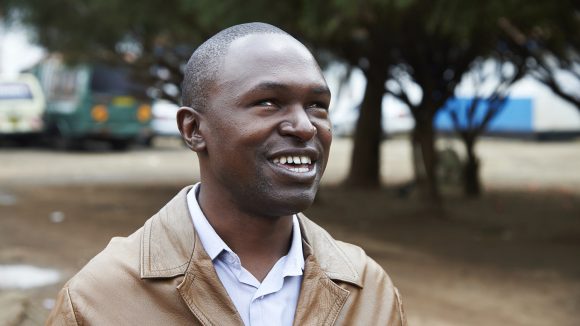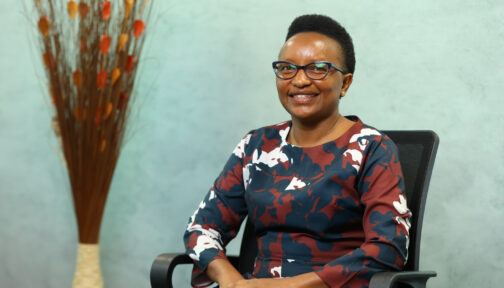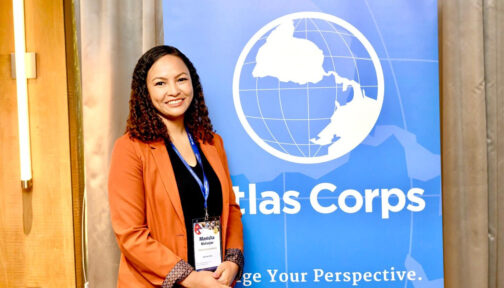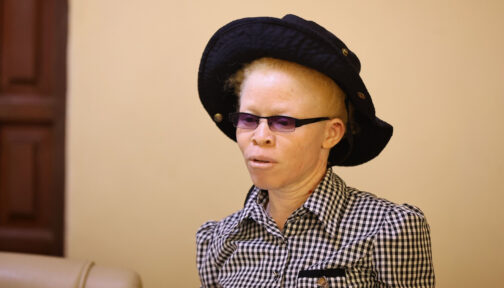Edwin Osundwa: “It’s vital to include people with complex disabilities in development”
Edwin Osundwa is the director of Sense International, Kenya.
He is a key member of both the disability inclusive business and inclusive early childhood development education programmes in Kenya – part of the Inclusive Futures initiative.
Here, he shares what he believes is the strength of the initiative and how his career and personal experience mean he is able to provide technical oversight to the projects.
Edwin’s story
“I started as a junior programme officer doing fieldwork, which gave me a rich understanding of the realities of working with people with disabilities, on top of being visually impaired myself.
“I have 15 years of advocacy experience within the disability sector at local and national levels, as well as the global level. I worked my way up from the grassroots and throughout the years had roles in different areas of the development sector – from education to social protection and health.
“It gave me a rich understanding of how these different areas have an influence on people with disabilities, which is why it’s so important for them to work together to help people with disabilities.
“My work with Sense International has also taught me a lot about deafblindness. It’s vital to include people with complex disabilities, such as deafblindness, within development. I draw upon my experience working in the disability sector to ensure our programmes under the Inclusive Futures initiative are realising the rights of people with deafblindness, from design right through to implementation.
“I work with the country-steering committee to ensure our programmes not only support individuals with disabilities, but also their carers, families and the wider community. I provide strategic oversight to ensure our work on both our inclusive business and education projects are in line with international best practice, as well as being transformative and culturally relevant.”
Learning from COVID-19
“COVID-19 brought about new restrictions and limitations to my life and work, especially as a person with a visual impairment. It changed a lot of daily life; it made me appreciate gadgets which help me to communicate, learn and access information, more than ever – something that was so vital during the crisis.
“Both on a personal and professional level, it also made me realise how much work there is still to do when it comes to disability inclusion. We have not reached a time yet where the response to something like a pandemic fully takes into account the needs and rights of people with disabilities.
“My hope is that people with disabilities, disability activists, governments and policy makers take stock of how far we are left behind, and learn lessons. I hope the disability inclusion movement and its efforts will be reinvigorated. Governments say they are adopting disability services, but COVID-19 showed that people with disabilities are still being left behind – so what do we do to change that?”
Working towards a common goal
“I’m so excited to be part of Inclusive Futures because of the way all our organisations are coming together to implement programmes. The significant difference about Inclusive Futures is how we are bringing together organisations – the initiative draws upon each organisation’s expertise to make a difference in the lives of people with disabilities. We are working together towards a common goal.
“The disability movement initially experienced a lot of fragmentation in terms of how it implemented programmes and projects. Inclusive Futures, on the other hand, takes the rich and varied experience from each organisation and implements that into its comprehensive programmes. We are able to learn from each other but we are also learning lessons throughout and across the different projects – lessons that we are then able to share and apply to the next step of projects.
“Speaking as one voice also means we are speaking with a much louder voice. Together, we are more easily engaging with the government, who are now more willing to listen because of the size of our group, and they appreciate the expertise our projects bring to support people with disabilities in Kenya.
Making development inclusive of people with disabilities
“I believe that Inclusive Futures is truly able to achieve inclusion for people with disabilities. We have gone through so many phases of planning for disability work. Take education, for example. We started with educating people with disabilities in special schools and now we are moving towards ensuring mainstream education includes children with disabilities, so all children can learn together. We are now seeing a movement where we are starting to see inclusion and I do hope and believe that the work of Inclusive Futures is able to achieve total inclusion for people with disabilities.
“Inclusion, to me, means that projects must be designed to reach those that are hardest to reach and furthest left behind. Projects must also not promote the divide that exists, but, rather, close that gap. If we plan with the idea of ‘lesser the gap, the better’, then we are on the path of achieving inclusion.”

Edwin Osundwa
Director of Sense International, Kenya.
Interested in delivering disability inclusive development?
Download our resourcesMore from our people

Mellen Marucha: “Our starting point must be ensuring parents understand and embrace inclusive education”
Mellen Kemunto Marucha is the senior programme coordinator at Sense International in Kenya – an Inclusive Futures partner working with and for people with complex and multiple disabilities to ensure they have the right to live, learn and thrive in an inclusive society.

Manisha Maharjan: “Inclusion benefits everyone, not just those directly impacted”
Manisha is project manager for Humanity & Inclusion and leads our education project in Nepal, funded by UK aid under Inclusive Futures.

Lucy Odwar: “Women with disabilities face many challenges”
Lucy is a director in the department of gender, social services and disability inclusion in Homabay County government. Through her work as part of the Homabay County Disability Forum, she supports the Global Labor Program – Inclusive Futures.